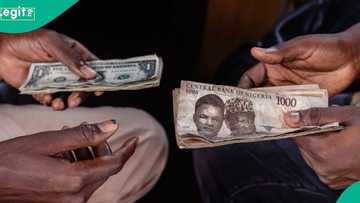Naira Holds Strong as Dollar Slips, External Reserves Climb above $42bn on Rising Inflows
- The naira has remained strong against the dollar in the official and parallel markets amid surging inflows
- Details from the foreign exchange market show that the naira still traded below the N1,500 market rate in the FX market
- In the black market, the Nigerian currency rallied massively to N1,514 per dollar, the highest in five months
Pascal Oparada, a reporter for Legit.ng, has over ten years of experience covering technology, energy, stocks, investment, and the economy.
The naira closed Thursday, September 25, 2025, with little change against the US dollar at the Nigerian Autonomous Foreign Exchange Market (NAFEM).
It appreciated by 30 kobo to settle at ₦1,488.26 per dollar, compared to ₦1,488.56 recorded the previous day.

Source: Getty Images
Trading data from the Central Bank of Nigeria (CBN) showed that the local currency hit an intraday high of ₦1,491 per dollar, marking an improvement from ₦1,498 quoted a day earlier.
The naira trades below N1,500/$
The steady trend underscores the relative calm in the forex market, despite lingering concerns about demand pressure.
Analysts say the naira’s stability reflects adequate foreign exchange supply, with the CBN maintaining interventions and increased export proceeds flowing through official channels.
“The exchange rate movement suggests the absence of significant dollar demand at the official window,” a currency trader said.
Parallel market shows gains
The naira also gained ground at the parallel market, rising by 0.29% to settle at an average rate of ₦1,514 per dollar.
The performance at both windows suggests improved liquidity, sustained CBN intervention, and growing confidence among investors.
Market observers believe the resilience of the naira is tied to the country’s swelling foreign reserves, which act as a buffer against volatility and improve the CBN’s ability to defend the currency when needed.
External reserves cross $42 billion
Nigeria’s external reserves increased to $42.202 billion on Wednesday from $42.169 billion the previous day.
The rise was driven by steady inflows from crude oil sales, diaspora remittances, and renewed foreign portfolio investments.
According to a report by Market Forces Africa, the stronger reserves position enhances Nigeria’s capacity to stabilise its currency, meet external obligations, and reassure international investors of improved macroeconomic fundamentals.
Analysts note that the reserves growth is a critical confidence booster at a time of global economic uncertainty.
Foreign portfolio investment boost
Fresh capital inflows are also coming through Nigeria’s equities market.
Data from the Nigerian Exchange (NGX) showed that foreign portfolio investment (FPI) activity rose by 17.7% in August 2025, climbing to ₦171.81 billion (US$112.18 million) from ₦145.95 billion (US$95.17 million) in July.
This accounted for 18.91% of the total market turnover of ₦908.38 billion. However, domestic investor participation fell sharply by 55.9%, dropping to ₦736.57 billion from ₦1.67 trillion in July.
Analysts linked the decline to the absence of institutional block trades that had significantly lifted volumes in the previous month.
Outlook: More stability ahead for naira?
With stronger reserves, rising foreign inflows, and active CBN interventions, market experts are optimistic that the naira will continue to trade within a relatively stable band in the near term.
However, they caution that sustaining this momentum will depend on consistent export inflows, effective monetary policy management, and global oil price trends.

Source: Getty Images
For now, the naira’s steady performance and the boost in reserves offer a much-needed relief for Nigeria’s economy and foreign investors watching its currency trajectory.
Naira strengthens as CBN confirms new exchange rate
Legit.ng earlier reported that the naira’s value improved again in the Nigerian foreign exchange market as rising external reserves continue to spur investors’ confidence.
Several analysts have expressed optimism that the Central Bank of Nigeria (CBN) would maintain its stance to defend the local currency till the end of the year.
The consistent rise in external reserves has also enhanced market confidence in the absence of capital restrictions.
Source: Legit.ng



